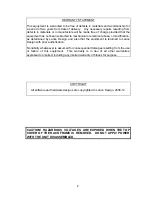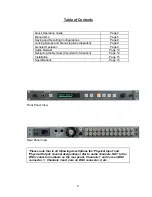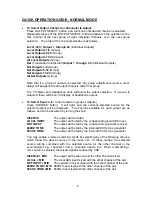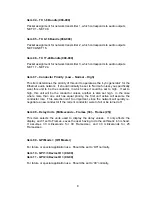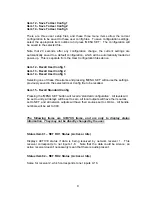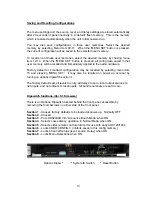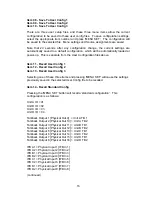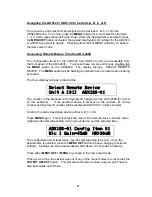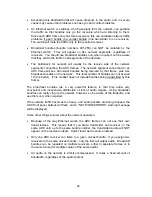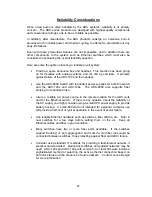
12
System Configuration In Normal Mode
The ADX-2400 is designed to provide delay, level control and distribution for effects
or commentary audio. The system can be used for stand-alone delay of 24 audio
channels, or can be used to transmit and receive audio signals via a standard
Ethernet data network (24 transmit and 24 receive channels simultaneously), or the
combination of both functions.
The system is 'output oriented'. It can be thought of as having 48 outputs: 24 'local'
outputs on the rear panel, and 24 'network' outputs which are sent to the Ethernet
network. Each of these 48 outputs can be set up as follows:
SELECT SOURCE:
SILENCE, LOCAL INPUT, NETWORK INPUT, TONE1 (888HZ), or TONE2 (560Hz),
(or the one of the above sources mixed with the source from the other channel of the
even-odd pair, for stereo summing)
ADJUST LEVEL:
OFF to +12DB in 0.25DB steps
ADJUST DELAY:
0 milliseconds to 680 milliseconds (20 frames in 30fps), in 1 millisecond steps
The configuration of each output is independent, although you can select groups or
all to save setup time if you are setting them all to be the same.
The unit should also be thought of as having 48 inputs: 24 AES inputs on the back
panel, and 24 inputs from the network receivers.
Application Examples:
For stand-alone delay, all outputs would be set to 'local input', and level and delay
adjusted as desired. The network tx/rx would not be used.
For transmitting effects to another truck, and inserting delay in the path: The network
outputs would be set to 'local inputs', routing the analog audio inputs to the network
transmitters. Delay and level adjustment could be done as desired. The local outputs
could also be set to 'local inputs', providing an independent local delay. Alternatively,
the local outputs could be set to 'network inputs', and these used as network
receivers for audio coming back from the other truck.
Distribution of effects or other audio to multiple trucks could be accomplished by
transmitting the audio using broadcast bundles, and receiving at each point of use.
Delay and levels could all be adjusted independently at the receivers, or globally at
the network transmitters.


